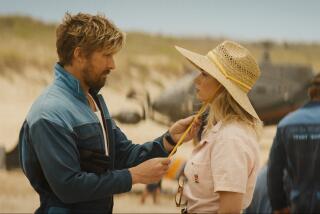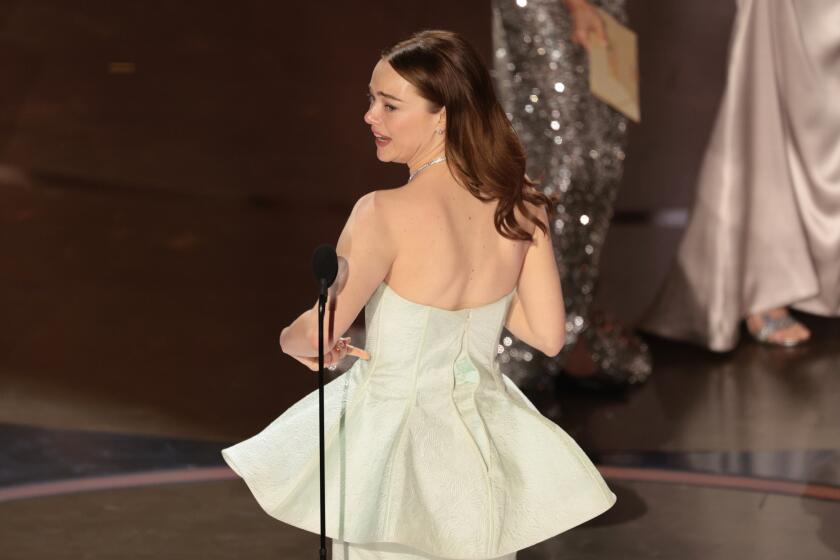Prejudice, Unexplained Death in ‘Snow Falling on Cedars’
The fog is thicker, thicker than you can imagine. The sound of the sea is the only one heard. Out of nowhere, a pair of one-man fishing boats come face to face. Wary, disbelieving, the owners stare at each other--it’s not a friendly stare. What happens between them isn’t shown, but the next morning one is found dead and soon after the other is arrested for his murder.
This is how it begins for “Snow Falling on Cedars,” the film version of David Guterson’s thoughtful, evocative thriller that tracks the racial and social fissures in the fictional Pacific Northwest island community of San Piedro as they’re gradually uncovered by that 1950 murder trial.
Because Guterson’s book, a genuine word-of-mouth success, was so compelling, top creative talent attached themselves to this project, starting with director Scott Hicks (in his first time behind the camera since “Shine” and its seven Oscar nominations), screenwriter Ron Bass and Oscar-winning cinematographer Robert Richardson.
But while there are things to like about this film, the poetic realism of Richardson’s cinematography and Jeannine Oppewall’s production design high among them, “Snow Falling on Cedars” has to fight to hold our attention and it doesn’t always succeed. That’s because it’s a film without a hero, at least a hero that can function in an acceptable cinematic manner.
On one level, of course, “Snow Falling” has an obvious hero in brooding Ishmael Chambers (Ethan Hawke), who runs the town’s one-man newspaper, the San Piedro Review, as a legacy from his late father, Arthur (played in flashbacks by Sam Shepard).
*
Ishmael’s pained expression rarely varies, and there are two reasons for it: the arm he lost in the South Pacific and the love he lost, also because of the war. As a high school student he became involved with Hatsue Miyamoto (Youki Kudoh), a member of the island’s tight-knit Japanese community. It was a taboo relationship even before the war, and after Pearl Harbor, when Hatsue and her family were incarcerated in California’s Manzanar camp, it became impossible. Hatsue ended up marrying Kazuo Miyamoto (Rick Yune), the man on trial for murdering Carl Heine.
A decorated war hero, Kazuo had a complicated relationship with the dead man and his family involving the local custom that made it unheard of for Japanese to own the local strawberry-growing land they often worked on. As Kazuo’s wily legal practitioner Nels Gudmundsson (a scene-stealing Max Von Sydow giving the film’s best performance) conducts his defense, it gradually becomes clear how much the unspoken “those people” kind of prejudice against the Japanese existed even before the war.
Because it flashes between the present, the war and the prewar years, “Snow Falling” is not always at that trial, but even when Ishmael’s not hanging around the courtroom looking morose he spends too much of the movie just sitting and thinking. In the book, we have the benefit of constantly hearing Ishmael’s thoughts, but given the lack of more than a hint of his interior monologues, this quickly becomes unexciting. Hawke is a fine actor, but he is not alive when he’s not doing anything, he doesn’t own the screen the way Brad Pitt, for instance, does, and if you’re going to have a character who doesn’t talk much but has his face writ large, that is what you need.
Watching “Snow Falling” also emphasizes how much bravura performances by Geoffrey Rush, Armin Mueller-Stahl and others brought an essential energy to “Shine.” Not only did they hold our interest, they diverted us from Hicks’ tendency, apparent in both films, to be too on the nose and turn minor characters into unfortunate cliches.
*
Also, although the novel’s success may have made this inevitable, “Snow Falling” seems too calculated and conscious of its own pedigree. It’s a reserved film, and given its reserved subject matter, it has a tendency to fall into ponderousness at times.
Yet there are other times, like the extensive and sensitive treatment of Manzanar exile Hatsue and her family are forced into, when the film’s poetic realism is a strength. (Keep an eye out for a brief, haunting home-movie clip of a girl ice skating alone; it’s from the celebrated Topaz footage, the only home movie aside from the Zapruder footage to be inducted in the National Family Registry, shot by Dave Tatsumo at the Topaz camp in Utah.)
At its most effective, a great melancholy hangs over the events of “Snow Falling on Cedars,” a somber, regretful film about the weight of the past, about great sadnesses that can only be healed over time and then only in part. The old-fashioned power of Guterson’s story finally triumphs, but it’s a much harder-fought victory than we might have hoped for.
* MPAA rating: PG-13 for disturbing war images, sensuality and brief strong language. Times guidelines: some fairly graphic World War II combat sequences.
(BEGIN TEXT OF INFOBOX / INFOGRAPHIC)
‘Snow Falling on Cedars’
Ethan Hawke: Ishmael Chambers
James Cromwell: Judge Fielding
Richard Jenkins: Sheriff Art Moran
James Rebhorn: Alvin Hooks
Sam Shepard: Arthur Chambers
Max Von Sydow: Nels Gudmundsson
Youki Kudoh: Hatsue Miyamoto
Rick Yune: Kazuo Miyamoto
A Harry J. Ufland/Ron Bass production, A Kennedy/Marshall production, released by Universal Pictures. Director Scott Hicks. Producers Kathleen Kennedy, Frank Marshall. Producers Harry J. Ufland, Ron Bass. Executive producers Carol Baum, Lloyd A. Silverman. Screenplay Ron Bass and Scott Hicks, based on the novel by David Guterson. Cinematographer Robert Richardson. Editor Hank Corwin. Costumes Renee Erlich Kalfus. Production designer Jeannine Oppewall. Art director Doug Byggdin. Set decorator Jim Erickson. Running time: 2 hours, 10 minutes.
Exclusively at the Mann Festival, 10887 Lindbrook, Westwood Village, (310) 248-MANN, #231.
More to Read
Only good movies
Get the Indie Focus newsletter, Mark Olsen's weekly guide to the world of cinema.
You may occasionally receive promotional content from the Los Angeles Times.







